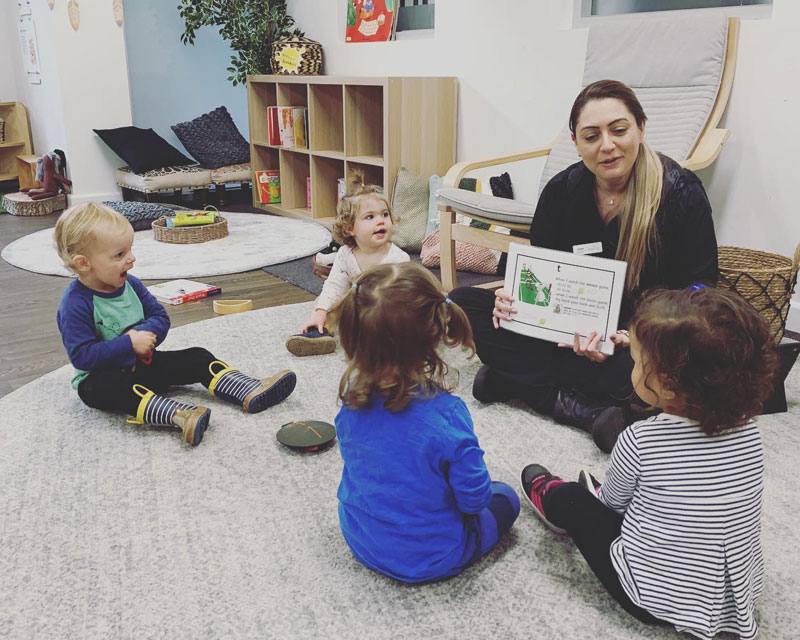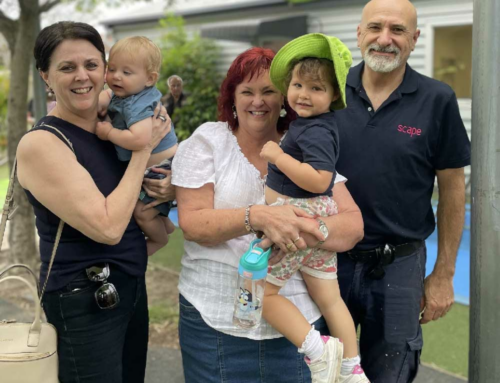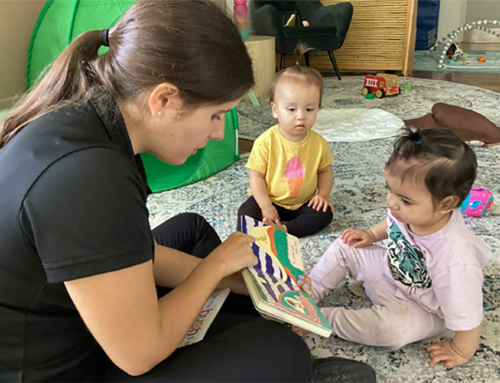Early childhood literacy activities go beyond reading and writing. Children develop literacy as they engage in everyday experiences. Things like singing, cooking, folding the laundry and shopping can help your child develop skills for learning and engaging with society.
Families seeking literacy activities for their preschooler or toddlers will find practical ideas below that they can do with their child at home. These literacy games and activities make learning fun without it feeling like they’re in a classroom environment.
We invited Dejana Klipa, an Early Childhood Teacher at Petit Early Learning Journey Richmond for advice on:
- Developing literacy skills for preschoolers.
- Defining what literacy skills are.
- Examples of home-based literacy activities.

Why is it important for preschoolers to develop literacy skills?
Literacy skills help us to understand information. Supporting children to develop literacy skills increases their success in finding employment later in life. It also provides other benefits, like improving self-esteem and social engagement through effective communication.
“It’s important for children to develop their literacy skills as this forms a foundation for their ability to communicate, read, write and also socialise with other peers,” says Dejana.
Without adequate literacy skills children can also fall behind in learning and this affects other areas like numeracy in older years. Poor literacy skills can make it difficult for a child to understand what is being asked of them in homework sheets or exams in primary school.

What are literacy skills – is it just about learning to read?
“Literacy skills are far more than just reading,” says Dejana. “The development of literacy skills also includes the children’s ability to become aware of sounds of language, awareness of print, the relationship between letters and sounds, vocabulary, spelling and comprehension.”
The Early Years Learning Framework (EYLF) uses a broad definition of literacy that encompasses different types of texts including those “we read, view and listen to and that we create in order to share meaning.”
While literacy is prominent in Outcome 5 of the EYLF, “Children are effective communicators”, it involves more than reading and comprehension skills. It also inspires certain behaviours and qualities through the use of multimodal texts, which assist children in:
- Becoming confident and involved learners.
- Becoming self-sufficient.
- Working well with others.
- Being open to other ideas and opinions, including those of diverse cultures.
- Exploring creativity and different points of views through dramatic play, dance, music and oral storytelling.

Literacy activities for Preschoolers and other young children
It’s important to note that literacy learning doesn’t begin at school, in preschool, or at kindergarten. We start developing literacy skills from the moment we’re born and continue to do so as part of our lifelong learning.
Families can nurture learning with literacy activities for preschoolers and other young children at different times throughout the day while at home or out and about. We’ve developed this list of home-based literacy activities with Dejana’s help.
- Reading stories: Reading stories to your children and asking them to share their thoughts and ideas helps them to develop their listening skills, vocabulary and understanding.
- Developing a book area: Set up a place where your child can access and explore different types of texts. These could include picture books, magazines or children’s reading tablets that encourage them to take the lead.
- Singing songs and nursery rhymes: Using verbal and non-verbal gestures when singing songs to children, for example, posters, props and hand gestures promotes literacy skills. You can also sing songs for transitions and for activities like brushing teeth, washing hands, putting toys away and dinner time.
- Encouraging daily reciprocal conversations: You don’t need lots of time or school learning resources for literacy activities. Explore the home environment and find interesting objects. Discussing what you see can inspire open-ended conversations.
- Playing games: Playing group games with other family members that relate to your children’s interests also inspires discussion. Many games use symbols to express and communicate ideas, like Snakes & Ladders or I Spy using colours or descriptions. For example, “I spy with my little eye something you might climb.”
- Using art forms and resources: Art can inspire your child to express ideas and communicate feelings when their words are not yet developed. Art activities that use chalk, painting, cutting out and pasting pictures can be used to invite discussion and create meaning-making.
- Exploring sounds and music: Music activities are highly beneficial for engaging and stimulating the brain. You can use musical instruments like shakers, tambourines and toy xylophones to express and communicate feelings.
- Using light and shadow play: Torches provide a captivating way to tell stories. Discussing your child’s interests and giving them the torch and other resources to help their play inspires exploration and discovery.
- Exploring puppetry, role play and dramatic play: These play-based vehicles help young children to reflect on and communicate their experiences.
- Providing a literacy-rich environment: You can organise your child’s play area and other spaces within your house to inspire children’s engagement in literacy experiences. Invite your preschooler to help with cooking and finding ingredients.
Outside your home, there are ample literacy-rich experiences to enjoy. You can engage your child in everyday literacy activities with street signs, posters, shopping dockets, restaurant menus and other objects while shopping or dining.

Give your child the best start with Petit Early Learning Journey
Inspire your child to develop the literacy skills they need for life with Petit ELJ. We believe children are active learners. Their interactions with people, places and things directly contribute to their learning experiences. Every moment is a rich opportunity to learn.
Children are motivated by their curiosity. They’re natural explorers who investigate their environment with an inclination to learn more about it. Come discover your inner child at your Petit Early Learning Centre.






